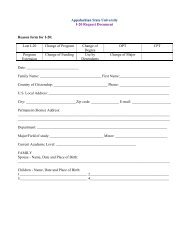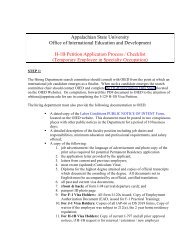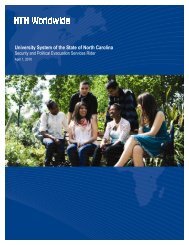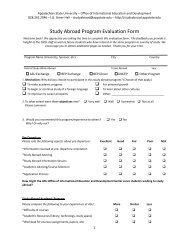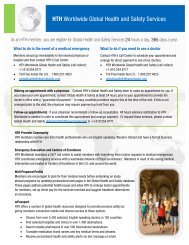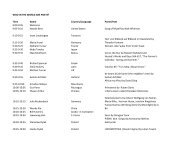Program Leader Handbook - International Education and ...
Program Leader Handbook - International Education and ...
Program Leader Handbook - International Education and ...
Create successful ePaper yourself
Turn your PDF publications into a flip-book with our unique Google optimized e-Paper software.
41<br />
Appalachian Overseas <strong>Education</strong> <strong>Program</strong>s <strong>Program</strong> <strong>Leader</strong> <strong>H<strong>and</strong>book</strong><br />
<br />
Highlight your program specific crisis management plan: (refer to the Appalachian-ICMP when designing your plans)<br />
- Emergency contingency plan: Explain to students what procedures they should follow in case of a crisis such as a political<br />
or natural disaster emergency (e.g. location of gathering place for emergencies) <strong>and</strong> remind students of the importance<br />
of carrying their “emergency contact cards” with them at all times, should they not be able to join the group. Also explain<br />
what students should do in case they get separated from the group at any time.<br />
- Communication with friends <strong>and</strong> family: Explain to students that while it is a participant’s instinct to call, text message,<br />
or e-mail home <strong>and</strong> friends when a crisis occurs, a panicky phone call, cryptic text message or e-mail message could<br />
elicit unnecessary anxiety <strong>and</strong> impair reasoned judgment. Discuss emergency communications with your program participants<br />
<strong>and</strong> advise them to be careful about their discussion with local or international media about the crisis. Remind students<br />
that the Associate Vice Chancellor for Public Affairs is the only official spokesperson authorized to speak to the<br />
media on behalf of Appalachian during a crisis situation.<br />
- Evacuation <strong>and</strong> program cancellation procedures <strong>and</strong> criteria: Discuss how the program leader will assess the situation<br />
together with OIED <strong>and</strong> the Appalachian-ICMP team in consultation with the nearest U.S. Embassy or Consulate.<br />
Explain that if a participant refuses to comply with an evacuation procedure, a release form should be signed.<br />
- Student crises: Highlight steps students should follow in situations such as harassment, missing classmate, legal or<br />
medical issues, <strong>and</strong> remind students to refer to the AOEP Student <strong>H<strong>and</strong>book</strong> for more details.<br />
- What to do in case the program leader is incapacitated: Explain the availability of assistance on site as well the possible<br />
involvement of program associates <strong>and</strong> what to do in case you are not able to continue leading the program.<br />
Explain how, in case you are not able to do so yourself, students should contact OIED at the contact numbers listed in the<br />
AOEP Student <strong>H<strong>and</strong>book</strong> or, if no answer, Appalachian Police at 828-262-8000 (24/7) with appropriate details of the crisis<br />
situation following the guidelines provided in the <strong>International</strong> Incident Report Form (included in the Appalachian-<br />
ICMP <strong>and</strong> the AOEP Student <strong>H<strong>and</strong>book</strong>). Brief the students on the role of the Appalachian-ICMP team.<br />
6. Academic <strong>and</strong> Behavioral Expectations<br />
<br />
<br />
<br />
<br />
Discuss the AOEP Code of Conduct’s expectations <strong>and</strong> consequences for non-compliance to the Code (see Appendix E).<br />
Remind students of the following points in particular:<br />
- Students may not use or possess illegal drugs […] <strong>and</strong> will be subject to the laws of the country they are visiting, <strong>and</strong><br />
will be responsible for retaining <strong>and</strong> paying for legal representation. A student in possession of illegal drugs will be subject<br />
to immediate termination in the program <strong>and</strong> be sent back to the U.S. at his or her own expense. Additionally, explain<br />
that penalties for using illegal substances in the program destination can be much stiffer than in the U.S., <strong>and</strong> that there is<br />
nothing a program leader or the U.S. embassy can do to assist a student who is caught breaking the laws of the host country.<br />
- Occasional drinking of alcoholic beverages in moderation is permitted provided that students are of legal age in the<br />
country in which they are visiting. Excessive drinking is determined by behavior detrimental or incompatible with the interest,<br />
harmony <strong>and</strong> welfare of the university, or program, or program participants. <strong>Program</strong> participants engaging in<br />
such behavior accept responsibility <strong>and</strong> waive their right of process <strong>and</strong> consent to being sent home at their own expense.<br />
- Students are expected to be on time for scheduled program events or activities [as the program leader] will not stay behind,<br />
but will continue on the schedule with the group. Unless otherwise stated, a student’s participation in all scheduled<br />
AOEP activities is required.<br />
- Students must always notify the program leader of their whereabouts if they deviate from the group activities.<br />
- When necessary, the program leader will determine the appropriate disciplinary action required for violations of the<br />
AOEP Student Code of Conduct. The program leader’s decision is final.<br />
Additional student behavioral responsibilities: If your program requires additional expectations <strong>and</strong> student responsibilities,<br />
you may want to go over them <strong>and</strong> have the students sign “a contract” specific to your program.<br />
Explain that in many countries around the world, counterfeit <strong>and</strong> pirated goods are widely available. Inform the students<br />
that transactions involving such products may be illegal under local laws <strong>and</strong> that bringing back such products to the U.S.<br />
may result in forfeitures <strong>and</strong>/or fines or other legal difficulties.<br />
Go over the program’s course syllabus <strong>and</strong> remind students that to receive academic credit, they must participate in all<br />
pre–<strong>and</strong> post–travel orientation <strong>and</strong> academic sessions, attend all on-site scheduled events <strong>and</strong> complete all course<br />
requirements. OIED recommends that you outline in writing the following information on your AOEP course syllabus:<br />
- student behavioral expectations in addition to academic expectations;<br />
- academic, behavioral <strong>and</strong> financial consequences for non-compliance with Appalachian’s Code of Student Conduct;<br />
- the program leader’s authority to expel/send a student back home for non-compliance with the Code of Conduct.<br />
Revision Date 5/8/13<br />
507_AOEP_<strong>Leader</strong><strong>H<strong>and</strong>book</strong>



